Best Online Colleges and Universities in 2025
Get detailed information about tuition, accreditation, career prospects, scholarships, admission details and much more
Online degrees are popular today, and learning about the best online colleges is more important than ever.
The idea of being an online student in an online school may be new to you, but these accredited schools provide the same level of education as an in-person program and the option to pursue both a bachelor’s degree and a master's degree.
Balancing life and work with your studies sounds complicated, but a good online degree program can make it easier — especially one that’s a good fit for your educational needs.
In this guide, we’ll walk you through today’s ten best online colleges, why you should choose an online degree program, and what you should consider when searching for the best online school for your master's degree or bachelor's degree.
Let’s dive in.
What are the 10 best online colleges?
We’ve listed more than 3,000 colleges for every state, degree level, and specialization on our website. You'll find a complete guide with information on each college and its rankings.
The College Monk strives to provide a holistic approach to education. With that in mind, we also provide exhaustive information on tuition, careers, online program features, undergraduate program options, graduate program options, and more.
Below, we’ve listed the ten best colleges for online programs.
Our rankings are based on tuition, financial aid, acceptance rate, and more to help you find the best educational experience.
1. University of Florida
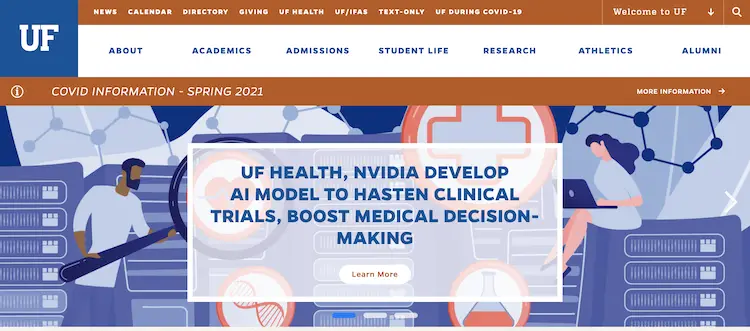
Acceptance Rate: 31.1%
Graduation Rate: 87.8% in 2018-2019
Institution Type: Public, not-for-profit
Yearly Tuition: $3,876 in-state, $16,580 out-of-state (plus fees)
Accreditation: SACS
SAT Range: 1290-1460
Established more than 160 years ago, the University of Florida (UF) is a dynamic school known for its research activities and educational programs. UF has established around 200 educational and research centers, institutions, and bureaus.
Students at UF learn from world-class faculty who encourage students to achieve career goals.
Around 80% of UF students receive financial aid, and the university has one of the country’s most comprehensive library systems for every discipline. The average GPA of UF students is 4.35, and the average SAT score is 1919.
Last year, UF received $838 million in research awards. The online university also offers career services and the same accredited undergraduate degree and graduate degree program options available on-campus.
Click here to visit the University of Florida website.
2. The University of Oklahoma
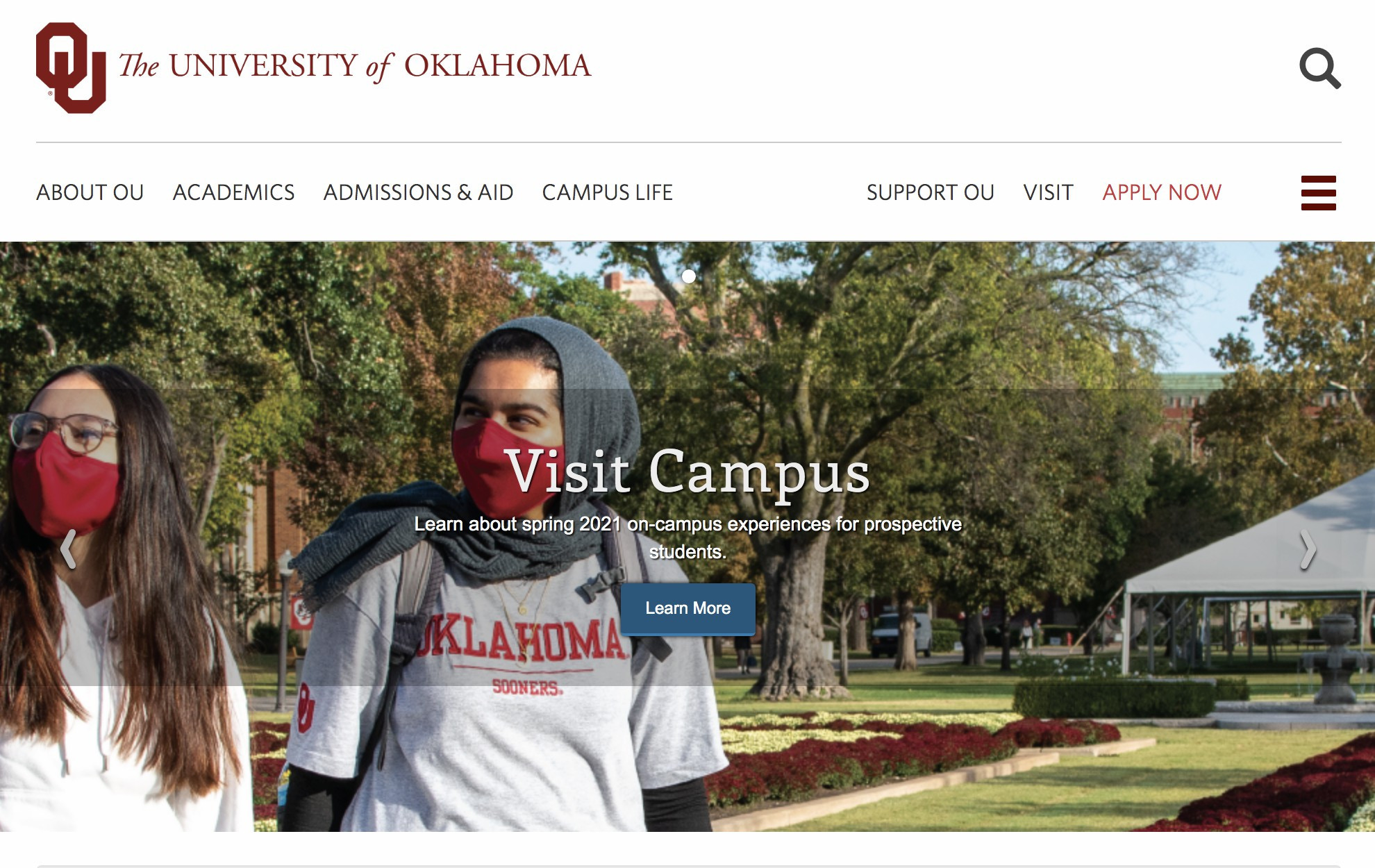
Acceptance Rate: 83.4%
Graduation Rate: 66.9% in 2018-2019
Institution Type: Public, not-for-profit
Yearly Tuition: $8,068
Accreditation: HLC
SAT Range: 1130+
Founded in 1890, The University of Oklahoma (OU) is home to more than 20,000 students. It offers around 170 bachelor’s degrees and boasts a diverse curriculum. It offers graduation coaching and peer mentoring, along with academic and personal support.
OU is one of the largest research universities in Oklahoma and stresses high academic achievement. The average ACT score of students at OU is 26.4, and more than 1,000 students are national merit scholars.
The university is also home to the National Weather Center, and students can pursue their research starting from their Freshman year.
Click here to visit the University of Oklahoma website.
3. The University of Utah

Acceptance Rate: 79.4%
Graduation Rate: 66.6% in 2018-2019
Institution Type: Public, not-for-profit
Yearly Tuition: $260 per credit hour, $6,240 annually (plus fees)
Accreditation: NWCCU
SAT Range: 1150+
The University of Utah (UoU) is one of the most innovative universities out there. In fact, the university has created multiple startup companies and encourages student and staff research. The university was founded in 1850 and has over 31,000 students.
It offers more than 80 majors in different degree levels. The university believes in providing an enlightening and unique education to each of its students and has created a portal, "Muse,'' to connect students with great experiences.
The same faculty deliver online programs and on-campus courses. They provide career service counseling to students as well.
Click here to visit the University of Utah website.
4. Florida State University
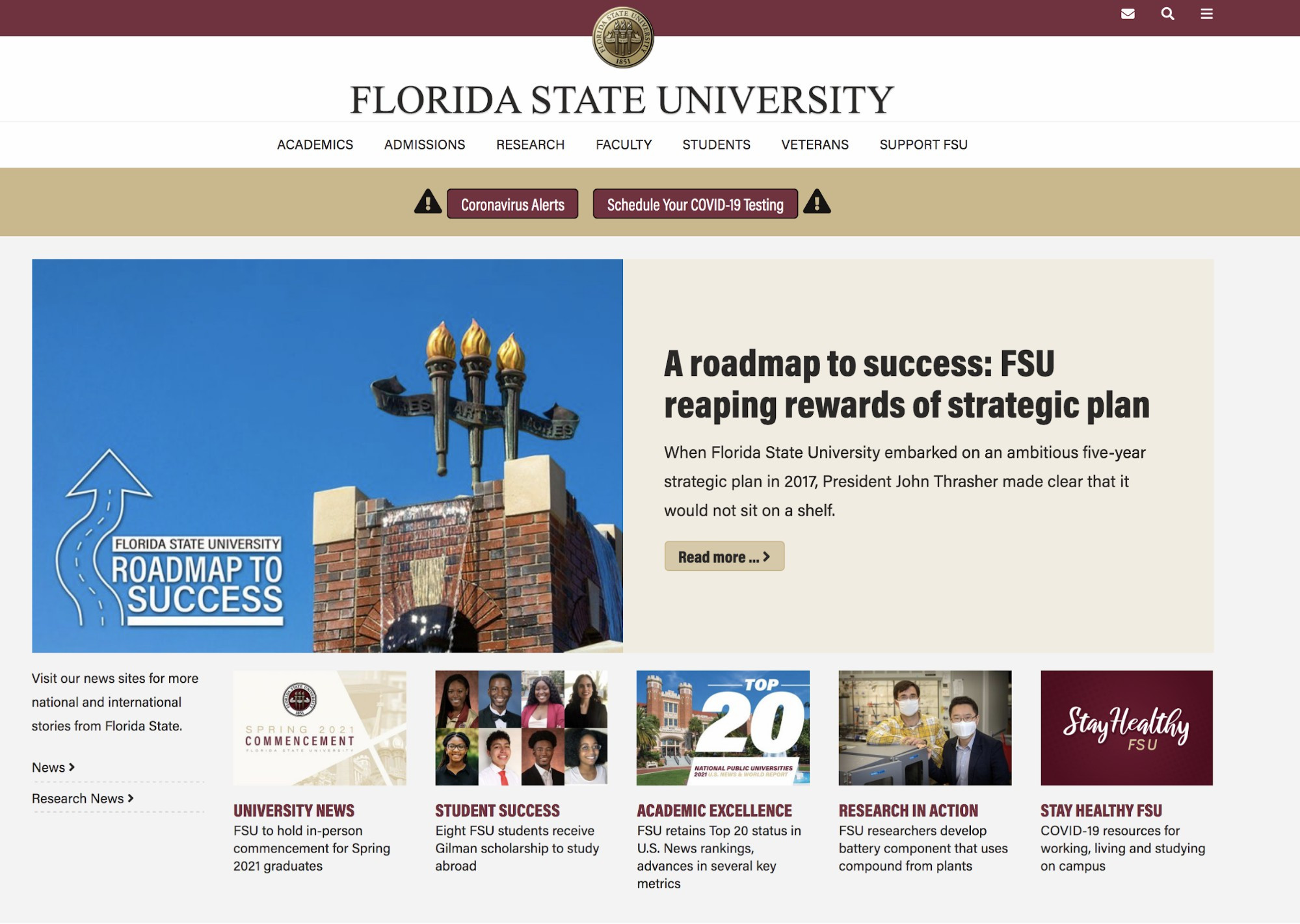
Acceptance Rate: 32.5%
Graduation Rate: 80.1%
Institution Type: Public, not-for-profit
Yearly Tuition: $180.49 per credit hour, $4,331.76 annually (plus fees)
Accreditation: SACSCOC
SAT Range: 1250-1400
Florida State University (FSU) was founded in 1851. It has a rich history surrounding the teaching of arts, science, technology, research, and more.
The university offers 301 programs in various degree levels, including available graduate and undergraduate programs in various fields. Recently, the university received around $210 million in grants and contracts.
FSU is the alma mater of six Nobel Laureates. The university preserves liberal arts traditions but also fosters diversity. This university has a Carnegie Commission classification of 'Highest Research Activity’ in doctoral universities.
It's also one of the best entrepreneurial universities, providing exceptional training and online education to undergraduate and graduate students alike.
Click here to visit the Florida State University website.
5. Oklahoma State University

Acceptance Rate: 67.1%
Graduation Rate: 61.3% in 2018-2019
Institution Type: Public, not-for-profit
Yearly Tuition: In-state $9,243, out-of-state $24,763.5
Accreditation: HLC
SAT Range: 1060+
Oklahoma State University (OSU) is a diverse university, boasting students from across 100 countries. Since its inception in 1890, it's grown from an agricultural and mechanical college into a land-granting university. Oklahoma State University is also a leader in research subjects, including engineering and health.
The school’s several scholarships and financial aid opportunities make the university affordable. Almost 50% of OSU students graduate without debt.
OSU also offers excellent online learning programs. According to OSU, 87% of its graduates have annual earnings of $45,000 or higher.
Click here to visit the Oklahoma State University website.
6. Ohio State University
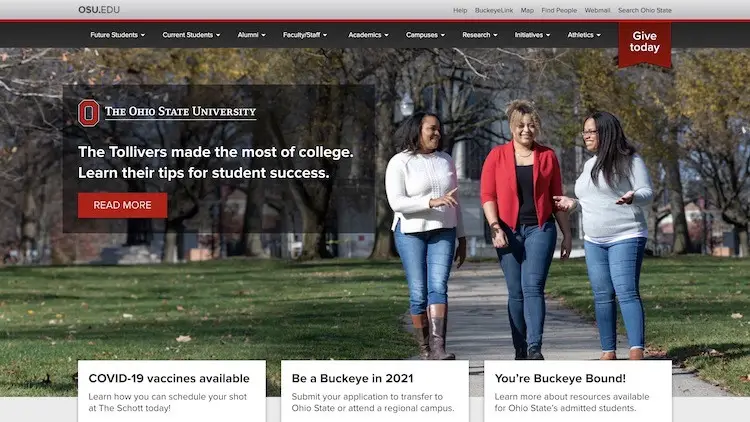
Acceptance Rate: 68.5%
Graduation Rate: 82.2% in 2018-2019
Institution Type: Public, not-for-profit
Yearly Tuition: In-state $24,256, out-of-state $25,056
Accreditation: HLC
SAT Range: 1210-1430
Ohio State University (OSU) is a public institution that dates back more than 100 years. It provides quality education for both traditional and online students. OSU is one of the largest research universities in Columbus, with regional accreditation granted by the Higher Learning Commission (HLC).
The university also provides financial assistance to students in the form of loans, grants, and scholarships.
The total population of OSU is 54,482, of which 51,817 are full-time students. The remaining 7,665 are part-time students. The institution is very selective, with an acceptance rate of 54% and a graduation rate of 84%.
Ohio State University offers online programs to earn an associate degree, bachelor’s degree, master's degree, and even a doctoral degree, all taught by well-trained and experienced professionals.
Click here to visit the Ohio State University website.
7. Clemson University
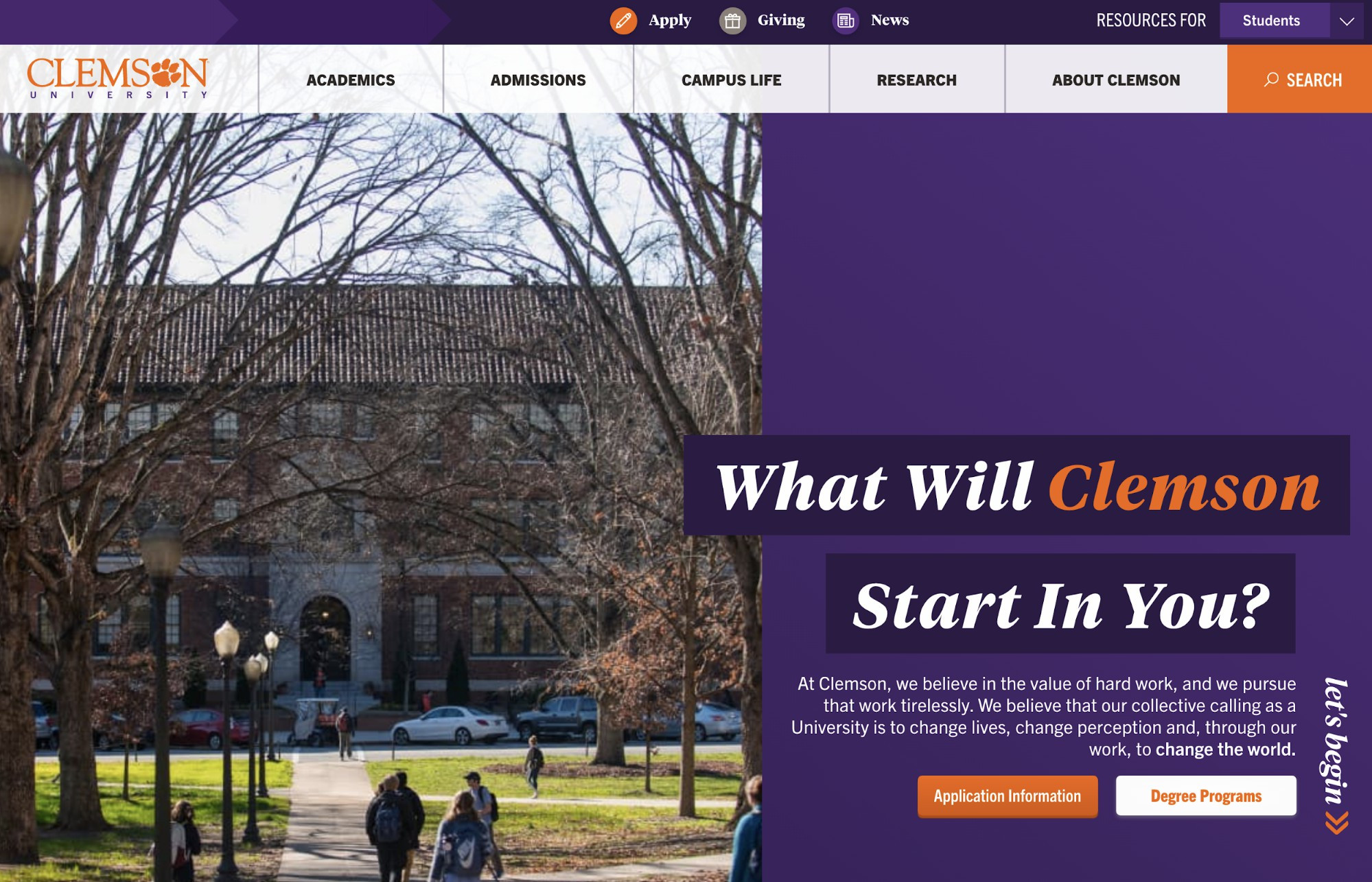
Acceptance Rate: 61.9%
Graduation Rate: 82.1% in 2018-2019
Institution Type: Public, not-for-profit
Yearly Tuition: $550 per credit hour, $13,200 annually (plus fees)
Accreditation:
SAT Range:
Clemson University (CU) is a four-year public institution established in 1889. From the start, the university's mission has been to help students get the best education at an affordable cost.
Clemson’s online and on-campus programs are well-structured and designed to cater to the needs of students who want to learn on their own. CU has an acceptance rate of 51% and a graduation rate of 81%.
Students can pursue their online education in various specializations and majors such as Health Science, Biology, Engineering, Business Management, Environmental Science, etc. These programs allow individuals to take classes at their own pace, with the flexibility of learning from anywhere.
The university’s financial aid unit provides financial support to almost 87% of students every year. This financial assistance comes in the form of grants and a few state and institutional scholarships available to students who demonstrate exceptional academic backgrounds.
Click here to visit the Clemson University website.
8. Heritage Christian University

Acceptance Rate: 66.7%
Graduation Rate: Not enough information
Institution Type: Private, non-profit
Yearly Tuition: $10,152 (plus fees)
Accreditation: ABHE
SAT Range: 780-1270
Heritage Christian University (HCU) is a not-for-profit, private bible institution established in 1968.
HCU is regionally recognized and accredited by the Association for Biblical Higher Education (ABHE).
The university provides various online courses to support individuals who don't want to commute to the campus to earn an undergraduate or graduate degree.
The majors for these programs include Theology and Arts. The university's financial aid department provides financial support in the form of loans, grants, and scholarships, including the Legacy Scholarship and the Undergraduate and Graduate Student Scholarship.
The Department of Student Affairs strives to enhance a student's emotional, intellectual, social, and physical well-being through events and opportunities for both online and on-campus students.
Click here to visit the Heritage Christian University website.
9. Liberty University
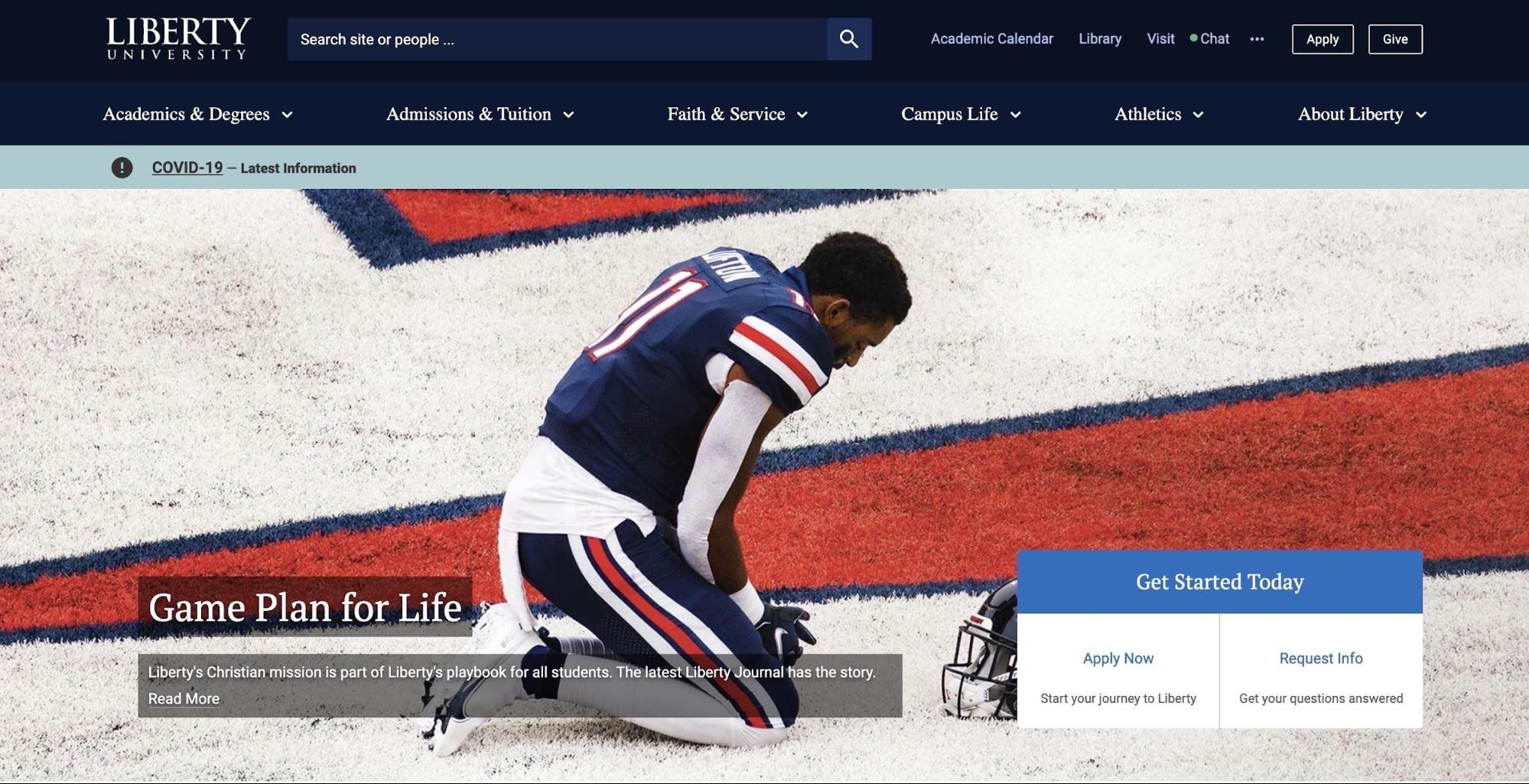
Acceptance Rate: 50.1%
Graduation Rate: 28.5% in 2018-2019
Institution Type: Private, non-profit
Yearly Tuition: Approximately $10,333 for full-time, $11,893 for part-time
Accreditation: SACSCOC
SAT Range: 1020-1220
Liberty University (LU) is a not-for-profit institution that's one of the country’s largest Christian universities, with over 75,756 students from different parts of the world.
LU has an acceptance rate of 30%, with a graduation rate of 51%. Liberty is the world leader in online programs that are well-structured and can help students pursue their online bachelor's degree conveniently.
Students at LU can pursue degrees including associate’s, bachelor’s, master’s, and even doctoral degrees in majors such as Nursing, Political Science, Public Administration, Sociology, Biomedical Science, and more.
The tuition and fees at LU are affordable, and the university offers financial assistance. Currently, more than 72% of LU students receive financial aid in the form of loans, grants, and several state and institutional scholarships.
Click here to visit the Liberty University website.
10. Arizona State University
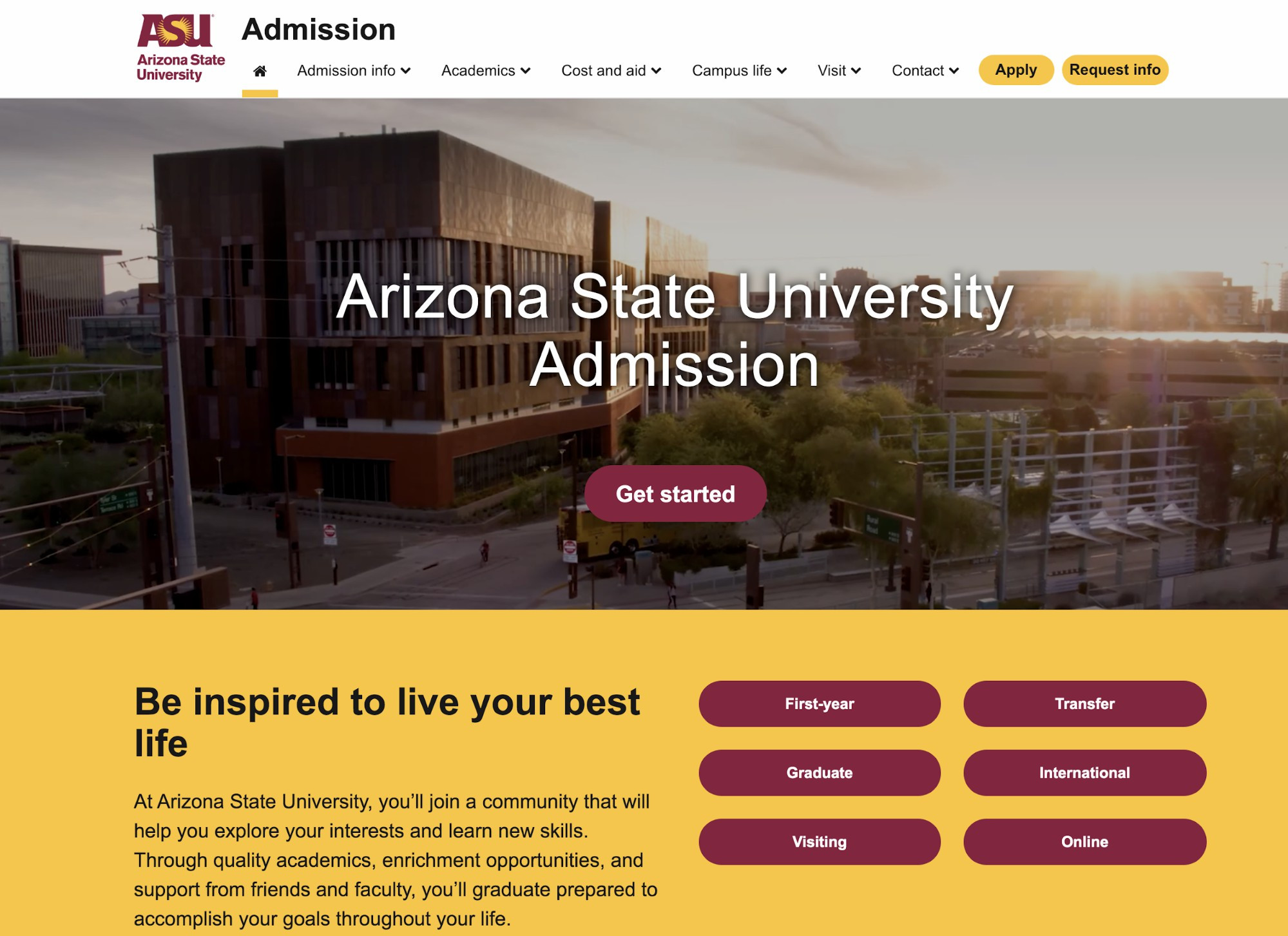
Acceptance Rate: 88.4%
Graduation Rate: 56.2% in 2018-2019
Institution Type: Public, not-for-profit
Yearly Tuition: $561–$661 per credit hour, $13,464-$15,864 plus fees
Accreditation: HLC
SAT Range: 1120+ (1180+ for non-residents)
Arizona State University (ASU) is a public institution located in Scottsdale, Arizona. It offers online and traditional courses that are perfect for students who want to pursue education from the comfort of their own homes. The university has 51,869 enrolled students from different corners of the world.
ASU offers online programs in various specializations, including Corporate Accounting, Certificate in Biomimicry, Art History, Family and Human Development, Biochemistry, and more.
The tuition and fees vary from program to program. Financial assistance is available in the form of grants and scholarships. Some students can even fund their education through work-study programs.
Click here to visit the Arizona State University website.
Online Learning vs. In-Person Learning
If you’re still wondering what the difference is between online and in-person learning, this quick comparison might help you understand better.
Online Learning | In-Person Learning | |
Flexibility | Online degrees allow for much more scheduling flexibility. You can study from anywhere, and if you choose a degree that offers an asynchronous format, you can also study at any time. Most online courses will allow you to go at your own pace. | Most on-campus programs will require you to adhere to a rigid synchronous format. This format means you will not be able to go at your own pace or schedule your learning time around your daily routines. |
Costs and Accessibility | Online degrees can often bring you some financial savings for reasons like the below:
Besides the lowered costs making an education more accessible to more people, the ability to learn from anywhere also empowers more potential students to earn their degrees. | On-campus programs usually adhere to in-state and out-of-state tuition costs. If you live outside of the state the school is located in, you will have to pay several thousand dollars more in tuition costs. There are also other costs to consider, such as those associated with:
|
Networking | Although the internet gives you the opportunity to meet people from all around the world, it can be more challenging to communicate. Context can get lost in text or translation. | Meeting and networking with people in person may allow you to make a better impression and forge more meaningful connections. And, even if you study on-campus, you still have the ability to meet people from various places in the world via the internet. |
Learning Environment | A disadvantage of learning at your own pace is that you’ll often need to study in spaces that are not optimized for learning. You may be exposed to frequent distractions that can make focus challenging. Self-paced online programs also require you to be capable of self-motivation, as there is a distinct lack of outside motivation when you’re in an asynchronous format program. | Most learning spaces at schools are specifically designed to be conducive to learning. Classes and lectures are also held in spaces where there are few to no distractions. Students also have the opportunity to learn in a more hands-on manner where applicable. |
What do I need to apply to online college?
Online programs will often ask prospective students to submit their applications online, making the process more convenient all around. However, the application requirements remain largely the same.
Accredited institutions will still expect the same levels of prior academic success from online applicants as they will from applicants to the on-campus programs. That means you will still have to meet the minimum GPA and grade requirements set by the institution. Besides the academic requirement, you’ll still also need to prepare a lot of paperwork and documents for your application. These documents include:
- Your transcripts
- A list of your academic achievements and honors, if any
- A compilation of your extracurricular activities, if any — including participation in charitable events and volunteerism
- Personal statements and essays
- Letters of recommendation
- Test results if necessary
Quick Tips for Applying to Online Schools
- Start taking notes of when application deadlines are for your preferred schools. Start gathering your materials early so you won’t struggle to complete applications in time. It’s a good idea to start working on your personal statements early, so you have some extra time to revise them should the need arise. You may also want to give your sources a few weeks or months of advance notice, so they have ample time to write your letters of recommendation.
- Consider your online presence and what it says about you. A lot of prospective students may not consider this factor when they apply to a school, but the fact is, your online presence can significantly impact an institution’s decision to admit you. Some colleges will readily admit that they check any social media accounts when considering an applicant for admission. Additionally, some schools may even take more than a cursory glance at online accounts if a potential student is also in consideration for any scholarships, financial aid, and the like.
What can I expect from online college courses?
When you start an online degree program, there are a few things that you can expect as a student.
First of all, because online courses are conducted via the internet, you should already know that you are expected to be familiar with technology. You don’t necessarily have to be extraordinarily tech-savvy, but you should, at the very least, know enough to find your way around a computer and the internet. For example, when taking online classes, you will have to find your way around the online learning platforms. You’ll also need to be able to do your assignments and submit them digitally. If you aren’t already familiar with technology, it’s a good idea to start getting used to it before you begin school just to make things easier on yourself.
Aside from the need to be familiar with technology, you will also need to have a computer or device capable enough to handle the demands of your courses and assignments. If your chosen major isn’t too intensely tech-demanding, you might be able to get away with using a tablet like an iPad for your classes. Besides a capable machine or device, you’ll also need to have a reliable internet connection — this connection will be the backbone of your education. It’s not too bad an idea to get a backup like mobile data just in case your internet goes down unexpectedly at the wrong time.
You can expect your education to be of good quality if you select a reputable program from a reputable school. Brick and mortar schools offering online programs often use the same curriculums for their on-campus and online programs, with the only difference being the delivery method. It’s also not unusual to see the same faculty members teaching online and on-campus programs at an institution.
One of the best things about studying online is the flexibility it affords you as a student. If the school uses an asynchronous format, you might even be able to completely build your learning schedule around your daily routine. However, this flexibility does also come with its drawbacks.
Self-paced online study will require you to be able to self-motivate since you are essentially responsible for if and when you complete your lectures and assignments. Self-motivation doesn’t always come easily, however, so you may face challenging times here and there. There are also countless distractions around you that you won’t fully be able to eliminate, so you can expect the need for self-discipline as you complete your studies. You will need to be able to stay focused even when everything else around you vies for your attention.
Finally, online courses may not afford you the same institutional support you might get if you were studying on-campus. However, more and more schools have started appointing advisers and counselors specifically designated to work with online students.
What's college like as an online learner?
No two colleges are 100% alike — even online colleges. Yet, you can expect a few basic similarities between each online college no matter which institution you decide to go for.
The first thing you can expect as an online learner is that you’ll be attending lectures and seminars at home or work instead of at a university campus. All of the teaching, materials, and support you’d typically expect from a college are delivered 100% online.
Online courses are generally condensed into bite-size credits. Each time you finish a part of your course, you'll achieve a credit. After you’re awarded enough credits, you’ll be able to complete the course.
When you’re studying with an online college, you’ll still need to log in frequently for classes.
You won’t be required to meet weekly in a classroom like a traditional college class — so online students are expected to log in as much as possible to digest the coursework, watch lectures, and study on their own time.
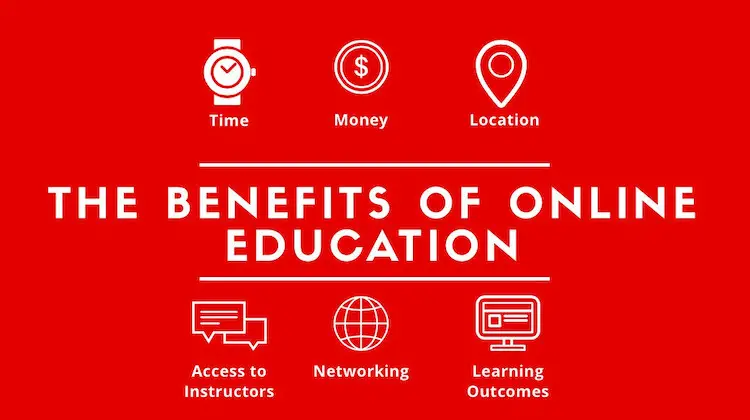
Just like an in-person college course, online learners are required to submit assignments and quizzes in line with the online course syllabus. The vast majority of this coursework will be submitted online through the online college’s virtual learning platform.
But every once in a while, you may need to travel onto campus to take a big test in person. That sort of requirement will depend on what course you’re taking and the university or college you’ve chosen to study with.
Finally, it’s important to remember that even though you’re earning your degree remotely, you should still expect some engagement with your peers.
Most online college classes will feature virtual discussion forums so that you can discuss ideas with fellow online learners and benefit from the same seminar style that in-person college students would receive.
Again, these forums are typically delivered online via the college’s online learning platform.
How to choose the best online college for you
There are many online colleges out there, so it can be a bit daunting when you’re first embarking on any sort of college search. At the end of the day, you’ve got to go with your gut and choose the school that feels right for you.
That being said, there are a few crucial elements that you should bear in mind when looking for the best online college.
Accreditation
First and foremost, you probably won’t want to waste your time looking at online colleges that are not accredited.
Accreditation is a vetting process colleges, universities, or specific degree programs undergo to make sure they fulfill a set of universal guidelines. Simply put, accreditation is a quality-control procedure.
Any online college worth its salt will voluntarily submit to the accreditation process to demonstrate to educators, students, and employers that the learning material is credible and acknowledged by relevant industries as satisfactory.
There are loads of accreditation bodies out there, so it’s important to do your homework and ensure that the online course you’re considering is accredited by a reputable institution.
The US Department of Education and the Council for Higher Education Accreditation recognize several accreditors.
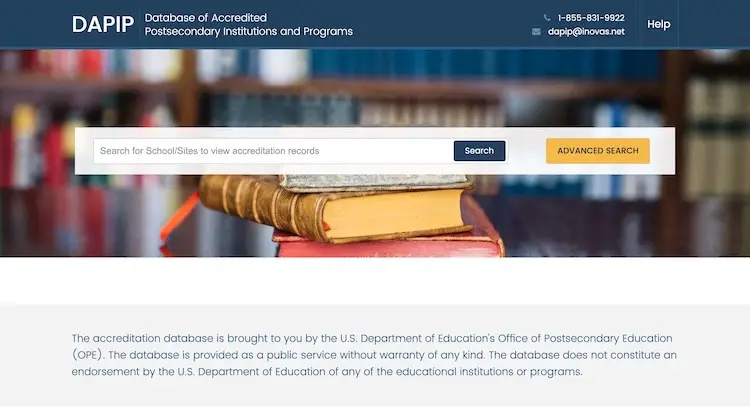
Some of these bodies are specific to certain regions within the US, and other bodies are industry-specific. For a complete list of bodies recognized by the US Government, it’s worth looking at the Department of Education website.
A word of caution: accreditation isn’t simply a matter of looking posh or ticking boxes. If you choose to go to an online college that isn’t accredited either nationally or regionally, you could end up paying the price in other ways.
For example, you are rarely going to receive federal financial aid if you’re trying to attend an unaccredited online college.
Likewise, going for an unaccredited online school will almost always block you from switching schools or programs if you spot something you’re more interested in.
Typically, when you transfer to another online college, you can take credits that you’ve already earned with you. That means you won’t be starting from square one and can pick up with your new course where you left off with your old one.
But if you’re studying at an unaccredited college, other institutions aren’t going to recognize the credits you’ve already attained.
Finally, picking an online college that isn’t properly accredited will almost definitely hurt your future employment chances.
Most employers carry out background checks on prospective students — which means they’re going to research the school you attended. If your desired employer isn’t satisfied with the degree you’ve attained, you’re going to miss out on jobs before you even get to the interview stage.
Cost
Although online degrees are typically a lot more affordable than traditional in-person courses, the cost is still going to vary from online college to online college. That’s why you must do your research to make sure you’re getting a fair price.
It’s important to note that colleges are businesses that need to make money. There’s no such thing as a free lunch — so you shouldn’t expect to get a degree for free either.
That being said, you should do your homework beforehand and look at the sticker price of each online degree you’re considering. Look at how they differ, and try to decipher if the more expensive courses offer any enhanced benefits or resources that you might get some use out of.
Likewise, you shouldn’t be afraid to approach online colleges directly to ask for a breakdown of fees before applying. Sometimes, colleges will advertise a certain tuition fee price — but then a student could be faced with an extra thousand dollars in their first invoice for hidden registration fees.
When in doubt, you should choose an affordable online college that is upfront about the costs you’re going to be expected to pay. If you’re still not sure how you’re going to pay for college, take some time to research scholarships and student loan opportunities.
There are dozens of funding methods available, and finding the right one for you is as simple as doing your homework and talking with trusted advisors and financial aid experts at the school of your choice.
Tech support
Let’s be honest; we’re not all tech wizards, right?
Not all virtual learning platforms are 100% intuitive, and sometimes we all need a helping hand with learning a new app or system. That’s why you must limit your online college search to schools that offer great virtual support.
The best online colleges should be able to offer you access to a dedicated IT or tech support team that can walk you through how to make the most of your virtual resources or complete tasks. This is typically going to be delivered through a live chat, responsive email threads, or even over the phone.
But the online support shouldn’t end there.
Because online degrees aren’t normally as structured as typical degree programs, you may also sometimes find you have trouble keeping on track and remaining focused.
That’s why your online college should offer access to a guidance counselor and support staff that can walk you through any issues you may be having or help you prioritize the new workload.
After all, just because you’re not physically on campus doesn’t mean your college shouldn’t exercise a duty of care. If you’re a student at a college, it’s in that college’s interest to see you succeed.
Don’t settle for an online institution without any guidance or career support to help you achieve success.
Course offerings
One of the trickiest parts of searching for the perfect online college degree is how many different courses there are.
The market is flooded with similar-sounding online degree programs. Even after you separate all of the online colleges that offer an accredited bachelor's program with great support, you’re still probably going to be staring at a shortlist of 100 different degree possibilities.
That’s why you should also consider how the courses are structured and what they offer in terms of added value.
For example, at first glance, you might find an incredible-sounding online computer science degree program. But once you look at the module breakdown, you realize that this particular course is going to require you to earn 22 credits studying ancient Rome.
If you’re paying to learn about computer science, taking tests about gladiators is going to be a waste of your time and money, right?

So, do your homework and analyze how each course is composed.
Many of the best online colleges and universities will now even let you create your own degree to a certain extent. That means you may choose an academic program, but then you’ll be permitted to pick or drop certain elements based on your unique interests.
At the end of the day, most undergraduate students choose to pursue an online degree because they want flexibility and to save money without compromising on quality. Your time as an online student is every bit as valuable as the time of a traditional in-person college student.
That means you should be focused on taking courses that cater to your interests and fall in line with your desired career trajectory.
Cohort
Last but not least, you should consider the kinds of people you want to go to school with.
As you move through your online college application process, there will probably be several questions about why you’re choosing to attend the university. There will likely also be questions about what you hope to gain from said university, besides a degree.
In asking these questions, most online colleges are trying to get a sense of the people entering the program and whether each online student is a good cultural fit for the school.
Here’s the bottom line:
Each university attracts a different cohort for different reasons.
Some people attend an online degree program because of its prestigious name or because the program offers a track or focus that appeals to them. Some are searching for flexibility, while others want to learn from a particular professor or faculty member.
Whatever the case may be for you, make sure you're taking some time to research the culture of the university in question. How large are the classes and cohorts? How much face-to-face time can you expect with your classmates? Is there group work?
Every student’s motivation to attend a university is different. At the end of the day, though, you should choose a university that places you alongside like-minded people who want to learn and grow the same way you do.
If you take your time and choose the right online program, you could emerge from this educational experience with lifelong friends and valuable connections.
FAQs about online colleges
Online learning is new to many people, so it’s natural to have questions.
To help you get started, let’s break down a few of the most frequently asked questions about online colleges.
Why choose an online college?
We all have different learning styles. Some of us learn better by doing things with our hands, and others need to be face-to-face or working in groups. Some students perform better when they’re working online.
Although online learning isn’t suitable for everybody, there are some significant benefits to pursuing your college degree in this way.
Enhanced flexibility
First and foremost, there’s an element of flexibility.
When you’re in a traditional face-to-face learning environment, everything has to be meticulously scheduled. That means your 9 a.m. class is always going to be at 9 a.m., no matter what morning crisis you’ve had with work or family.
When you’re pursuing an online degree, rigid schedules aren’t as much of an issue.
Online college degrees are typically composed of various classes or modules that you can work through at your own pace. This is a critical consideration for many students and a large driver of growing distance education enrollment rates.
You may have a certain live online class or lecture that does have a set time. However, many online universities and online colleges will let you go back and watch these on-demand.
With this added flexibility, you’re able to maintain a current job, juggle gaps in childcare, or simply enjoy more leisure activities without having to sacrifice your college degree.
Lower costs and debts
Let’s face the facts here: college degrees are expensive.
For the 2020-21 academic year, the average tuition for an in-person public out-of-state college was sitting at $27,020 per year. Want to go private? You’re talking about $37,650 of tuition per year.
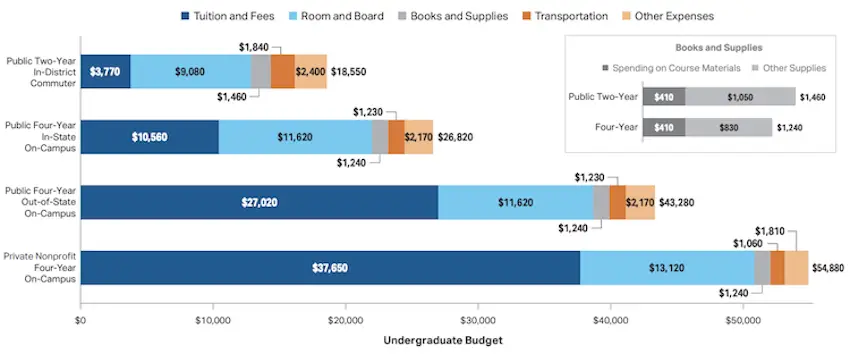
But that’s only the tip of the iceberg where costs are concerned.
You can add in an average spend of $11,620 for room and board, $1,240 for books, $1,230 for transportation, and $2,170 for other expenses.
Still with us? If math isn’t your thing, all of the above equates to $43,280 in costs each year — and that’s just for an out-of-state public school.
Whether you study online or in person, you’re always going to have to budget for tuition.
But by choosing an online college and pursuing distance learning, you’re going to slash those expenses dramatically.
Because you can study from wherever you want, you don’t need to worry about dropping loads of cash on room and board or transportation.
Likewise, a lot of online courses come with more affordable (or even free) ebook options that can save you thousands on textbooks throughout your studies.
That means your finances won’t be as stretched, and you won’t have to take out sky-high student loans to make ends meet.
Access to great colleges without moving
If you live in a rural area, there might not be many options for higher education around you.
Even if you’re in a metropolitan area with plenty of educational opportunities, maybe you’re not near your dream school, or you’re still too far from the program you want to attend.
In these cases, distance learning could be a great option. As online education becomes more popular, it’s expanding accessibility for students around the world. Today, it’s possible to attend the university of your dreams, all without uprooting your family or changing your life.
Stay in the place you love while obtaining the education of your dreams. It’s a win-win for everyone.
The ability to learn the way you want
If you’re someone who thrives in a digital environment, in-person schooling might be a bit difficult for you.
Online learning, on the other hand, could be your wheelhouse. There are different learning styles, and online learning may be easiest for people who are “read-and-write” or visual learners.
Online colleges give learners like you the freedom to absorb new information in the way that suits them best. There’s no more cramming yourself into someone else’s educational model.
Digital learning is a great way to take charge of your education and absorb as much information as possible.
Is online degree legit?
There is a myth that online degrees are not accredited, which means they are not legitimate. This article from Franklin University’s Back to College Blog details five commonly perpetuated myths about online degrees, including this one.
It’s easy to see why people may have this perception of online degrees. Although online education is rapidly gaining popularity, it’s still “new” to many. And, for a while, people simply didn’t afford online education with the same respect as the traditional means.
It is true that there are still some institutions out there still not accredited regionally or nationally. However, if you are careful to stay away from these schools, you can definitely earn an online degree legitimately from an accredited college or university. Make sure that you only consider the best accredited online colleges and universities when you start applying to schools.
It’s worth noting that a study from the SHRM (Society for Human Resource Management) reveals that 92% of potential employers see online degrees from reputable schools with a campus more favorably compared to 100% online schools — even if they are accredited. This may be because employers believe that brick-and-mortar schools dedicate the same level of effort to their online programs as they do their traditional in-person ones.
Is there a 100% online college?
You might be happy to know that the answer is yes — there are quite a few 100% online colleges nowadays. Colleges like Columbia Southern University and Colorado State University Global Campus, for example, are both fully online.
It’s important to note that you are not necessarily required to choose a school that’s 100% online. You can enroll in a 100% online degree even from colleges that have campuses, provided they offer an online version of the program. If it’s the flexibility of online school you seek, you might want to look for programs that conduct their classes in an asynchronous manner so you aren’t locked to a specific schedule.
Which online degree is best?
The answer to this question is purely subjective, especially since what may work for others might not be the right fit for you. It’s essential to choose the right degree from the right school to ensure that you find something that suits your interests and passions.
Before you decide, consider factors like the program's quality, the school's reputation, the costs involved, schedule flexibility, and more.
Are online colleges cheaper?
The general consensus seems to be that online colleges and programs are usually more affordable compared to traditional in-person schooling. This affordability is often why online degrees are touted as a more accessible way of earning an education.
There are several reasons why an online degree might be cheaper when compared to traditional colleges:
- Conducting an online program usually costs less in terms of overhead, resulting in a lower cost all around. The lowered overhead costs may also be why some schools price the tuition for online programs lower.
- Even if the tuition costs aren’t any or much lower, you can still save money because fewer opportunity costs are involved. For example, you no longer need to worry about transportation to and from campus (unless, on the rare occasion, you are required to visit campus for an exam or other reason). You also won’t have to move to your school’s location, which means no housing costs or campus meal plans are necessary.
You might want to keep in mind that even if online programs may be more affordable, that doesn’t always mean they’ll be cheap. It’s possible that you might still need some sort of financial aid such as federal loans or grants, student loans, scholarships, etc. Check with the school to make sure you explore all your options financially — why spend more than you need to?
How long does it take to get an online bachelor’s degree?
Online bachelor’s degrees aren’t much different from traditional campus-based degrees. For this reason, it’s likely that you’ll be able to complete your online bachelor’s degree from the best online schools in around the same amount of time. Standard undergraduate degrees usually take around four years to earn when the student is learning full-time, which means you can complete your online degree in four years as well.
If you are studying part-time, that timeline might go up a year or two. Whether on-campus or online, part-time studies might mean that an online bachelor’s degree can take four to six years.
Some students may want to finish their degrees as quickly as possible so they won’t have to commit as much time to their studies. They may also want to finish school quicker to start working as soon as possible. If this is your situation, you might be pleased to know that earning your degree in less than four years is possible. Some students can complete theirs in three. However, there are some programs available that can help you earn your degree even faster.
For example, the University of Wisconsin has the UW Flexible Option program. UW FO is a self-paced CBE (competency-based education) program that allows students to move as quickly through a program as they can manage — no traditional semester schedules involved. CBE programs are an excellent way to earn a bachelor’s degree quickly without compromising the standards of education.
The UW FO allows students to sign up for any course in their program during every subscription period, which means you can sign up for as few or as many as you’d like and learn at your own speed.
Although an accelerated CBE program can offer many benefits, it also comes with some drawbacks. Completing so many credits in such a short amount of time means you’ll likely need to dedicate thirty to forty hours every week (or more!) to your studies. Aside from the full-time commitment, you may also have to pay for all the credits during your studies, which means condensing four years of tuition into one year or so. Ask the school about your repayment options, such as whether they have deferred payment available. It might also be a good idea to check if financial aid options are available.
Do employers like online degrees?
To many people, a degree is a degree, regardless of where or how it was earned. However, there are still many people who may not view degrees earned online as valid or legitimate. It’s easy to understand why that may be, considering the newness of online education. Traditional on-campus education has been around for centuries. Considering online colleges have been around for merely a few decades, it feels almost as if it is still in their infancy.
Aside from the newness, people may also still be skeptical about online degrees because of many myths surrounding them. Add to that the fact that some online schools might not have the best reputations, and you might just start getting concerned.
Fortunately, the tides are beginning to change.
An Excelsior College and Zogby International study reports that 61% of small business owners and CEOs surveyed nationwide are aware of online programs and distance learning. What’s more is, out of those surveyed, 83% state that they find online degrees from the best online college programs to be just as credible as traditional education. The caveat? The degree would have to be from a reputable and accredited institution. Employers also state that they consider the quality of the graduates of those programs.
Also, as mentioned above, many employers view online degrees from brick-and-mortar schools more favorably than degrees from schools with no campus, even if those fully-online schools are accredited.
Is an online degree as good as a traditional degree?
For the most part, yes. However, it depends entirely on the online program’s quality.
Traditional degrees from on-campus programs usually come from regionally or nationally accredited institutions. To ensure you are getting the same quality of education from your online school, look for the best colleges online and make sure they are certified.
It’s worth noting that often, schools will have the same curriculums for their online and on-campus programs — the only difference would be the delivery method. In fact, it’s entirely possible for the online program to have the same faculty as the on-campus version.
Are online colleges worth it?
Good online colleges can be incredibly worth it, depending on what you’re looking for and what you want from your college experience. If schedule flexibility is your priority, that fact alone might already make online colleges programs worth it for you to pursue. However, the numerous other benefits of studying online listed above are hard to overlook, as well.
However, if in-person learning is more your style, you may not find earning a degree online worth it — even if you apply to the best online universities. You also might not appreciate the online learning experience as much if you are a social person that likes to be around other people. Online schooling can make it much more difficult to connect with others on a deeper level, considering the hurdles of distance.
Is it harder to get a job with an online degree?
Not necessarily.
The apprehension might make sense due to the newness and the myths surrounding online learning. Some of these myths can also give people some misgivings and make them skeptical about the level of success they can attain from distance learning.
However, as mentioned above, e
Liberty University
Lynchburg, Virginia
University Type: Private Not-For-Profit
Accreditations: SACSCOC
Student Faculty Ratio: 19:1
Acceptance Rate: 30%
Specialization offered: Educational Administration, Biblical Studies, Digital Marketing +41 more.
Total Programs Offered (184)
Capella University
Minneapolis, Minnesota
University Type: Private For-Profit
Accreditations: HLC
Student Faculty Ratio: 22:1
Specialization offered: Healthcare Management and Administration, Leadership, Project Management +33 more.
Total Programs Offered (255)
Colorado State University (CSU)
Fort Collins, Colorado
Colorado Technical University (CTU)
Colorado Springs, Colorado
University Type: Private Not-For-Profit
Accreditations: HLC
Student Faculty Ratio: 28:1
Specialization offered: International Business, Marketing, Healthcare Management and Administration +25 more.
Total Programs Offered (109)
Walden University
Minneapolis, Minnesota
University Type: Private For-Profit
Accreditations: HLC
Student Faculty Ratio: 18:1
Drexel University Online
Philadelphia, Pennsylvania
University Type: Private Not-For-Profit
Accreditations: MSCHE
Student Faculty Ratio: 10:1
Acceptance Rate: 75%
Specialization offered: Sports Management, Nurse Practitioner, Registered Nursing [RN] +33 more.
Total Programs Offered (192)
American Public University System
Charles Town, West Virginia
University Type: Private For-Profit
Accreditations: HLC
Student Faculty Ratio: 19:1
Specialization offered: Legal Studies, Public Health, Sports Management +39 more.
Total Programs Offered (238)
Keiser University
Fort Lauderdale, Florida
University Type: Private Not-For-Profit
Accreditations: SACSCOC
Student Faculty Ratio: 14:1
Specialization offered: Registered Nursing [RN], Technology Management, Public Policy +3 more.
Total Programs Offered (26)
University Type: Private For-Profit
Accreditations: DEAC
Student Faculty Ratio: 21:1
Specialization offered: Cyber Security, Registered Nursing [RN], Human Resources +9 more.
Total Programs Offered (63)









